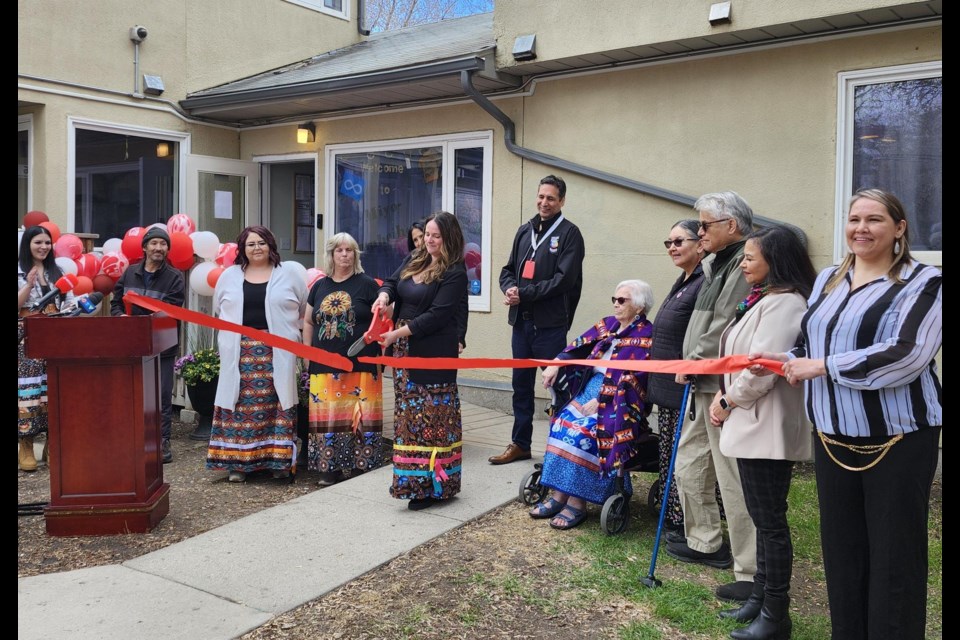SASKATOON — Elder Lorraine Stewart, seeing the work and the difference the officials and staff of the ²Ñ¾±²â´Ç-³¾²¹³ó³¦¾±³ó´Ç²âÄå²Ô Transition House have made in the community, said it is a considerable endeavour for people struggling with addiction and homelessness. ²Ñ¾±²â´Ç-³¾²¹³ó³¦¾±³ó´Ç²âÄå²Ô means "well-being" in Cree.
Stewart, who attended the ribbon-cutting ceremony formally opening the transitional housing on May 1 in the courtyard on Avenue R Â鶹´«Ã½AV, said she was pleased that the Persons Living with AIDS (PLWA) Network of Saskatchewan Inc. stayed alive and never quit helping people.
The facility is not only for people living with HIV — it welcomes anyone who wants to get sober and receive the support they need to get their lives back in order. Services include addiction and mental health counselling and help finding employment opportunities.
“I am so pleased. Thirty-seven years of scratching and trying to keep an organization alive, and we never quit. All of you who have participated, the board members, the members, this was a dream for us,” Stewart said.
“It's just starting. Homelessness is a big issue, and we're going to do something about it. We're going to continue to do something about it. Everybody's important. We want to help everyone. So, I'm so pleased. This is a dream come true.”
She encouraged everyone — from the staff to those undergoing treatment — never to give up, saying they are important and should always remember that people and organizations are willing to help.
Nathan Ziegler and Crystal Venne are two of the many people the ²Ñ¾±²â´Ç-³¾²¹³ó³¦¾±³ó´Ç²âÄå²Ô Transition House has helped, and they shared their success stories in overcoming the challenges they faced in their daily lives.
Ziegler said he lived on the streets for two years and looked for work to afford a roof over his head. One night, he decided to pray.
“If it weren't for bad luck, I'd have no luck. I went to my spot one night, and my day was done. I was going to sleep, and I thought, you know what? I'd better say a little prayer to the Creator, to give thanks. I did that,” Ziegler said.
“I don’t know from that moment forward, things turned around so quickly. I talked to a couple of people while on the streets, who advocated for me to get off the streets and into sober living — anything to get me off these streets. I'm 50 years old. I'm not a young man anymore.”
He was welcomed at the transition housing and took part in programs and activities — both traditional and non-traditional — which had a significant impact on his life. He advised those who feel they are down on their luck and just trying to survive that people are willing to help.
Venne shared her story of having alcohol and drug issues taking control of her life for more than 30 years, using substances to cope with trauma, pain, grief and stress.
“I used drugs and alcohol to numb out anything I didn't know how to face. It gave me temporary relief, but it came at a cost. My health, my relationships, and my self-worth. I became someone I didn't recognize, and worse, someone I didn't want to be,” said Venne.
“There came a moment where I realized I couldn't do it anymore. I was tired, tired of hurting, tired of hiding, and tired of pretending. That's when I was introduced to the PLWA Transition House. It wasn't a magic fix but gave me something I hadn't had in a long time. A safe place.”
She added that she and everyone at the transition house — the support structure — understood her and helped her without judgment, providing the tools to heal and face her fears and conquer them rather than escape them. She became sober and regained her trust in herself.




